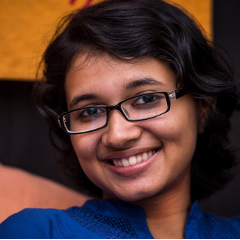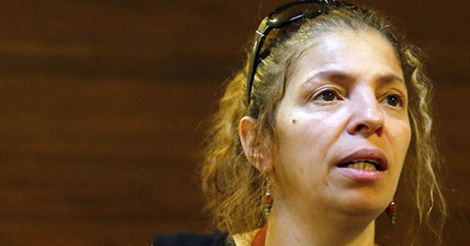Thiruvananthapuram: Rayhana Obermeyer’s I Still Hide to Smoke set against the backdrop of 1995 Civil War was well received by the audience at IFFK. The movie which shows the woman’s role in a man’s world is banned in her homeland Algeria.
She had to leave her country during the black decade fearing for her life and now lives in France.
In an interview with Onmanorama, Rayhana talks about the threats and challenges she faces every day from Islamic Fundamentalists.
Your film cannot be screened in Algeria. What made you do such a strong film?
To stand for what I believe was very important for me and I had to flee to France in the 90's as Algerian black days were at its peak. I Still Hide to Smoke was originally a play written by me and many couldn’t digest the content, the politics and the ideology of the play. But the play was definitely a huge success in France. It was the great director Costa Gavras who asked me to adapt it into a film. I was happy but he insisted me to direct the film. I was a pure theater person and had never thought of making a movie. Knowing that it would be a daring debut, I decided to face whatever comes in the way. The film is the story that I have lived myself.
I Still Hide to Smoke is very contentious for the strong portrayal of women in Algeria during the black days and for speaking against Islamic Fundamentalists. What challenges did you face for the release of your movie?
Challenges were many…Right from the shoot to the release of the movie and the threats that I still face. I took more than three years to adapt the film into a screenplay. The film was shot in Greece in a very limited time. The hammam was a museum in Greece and I was given permission to rent it out for 5 weeks. But when I reached the location along with the crew, they said only 4 weeks could be allotted. All our plans were changed and the budget was very less. Another challenge was to find the cast for my film. Though I wanted an Algerian actress for the lead, I couldn’t find any as anyone who decides to play the character will have to face humiliation from the country. Finally, I found Hiam Abbas to play the role. As soon as I released the movie, I started receiving death threats from Islamic Fundamentalists. It was on a Paris street one day that the religious fanatics poured gasoline and tried to burn me to death. I escaped by a whisker and I still receive death threats. “This time we missed you. Next time we will act for sure,” this was the recent threat that I got. But I cannot keep silent.
What was the idea behind such a powerful plot?
I didn’t make this film to get awards or honors. I wanted to help change the mentality of many people out there who still thinks women are inferiors and must be suppressed. The film is for all those women who were always muffled for what they believe in and to remind them that they are an independent human being just like men. They too have desires, politics and cannot be concealed within the four walls.
Can you tell us about the cast and crew of your film?
The film has only women as crew members and that was an extremely difficult task. Right from the actresses to editors and technicians, each one of us came from different places but stood for one cause - the uplift of women. We spoke different languages and to communicate with everyone and share ideas was challenging but when you decide to stand together, nothing is impossible.
Why the name ‘I Still Hide to Smoke’?
If you smoke, you become a prostitute. That’s what people think. It’s unhealthy and a crime but only if you are women. Why can’t women smoke if men can? What do we fear? And why do we fear? It’s not just about smoking but it’s about equality. It’s the right to do what we should be doing.
The film ends with many black clothes flying away depicting freedom. What is your personal view on the concept of hijab?
I am a person who is against wearing hijabs especially the black ones. The black ones reiterate that you have been suppressed and that you are confined to the black realities. By flying off the black clothes, I mean freedom for women. Throw it away and set yourself free. The film is to give awareness to women that one needs to remove the black veil to cover their voice and speak against wrong things. My mother wears a hijab. But when I was a child, I have never seen her wearing it. We are going backward, trying to confine women to little spaces, fearing their empowerment. I am not sure when things would change but my fight is on.
Read more: IFFK 2017 | Interview : No one offered mainstream roles after national award: Surabhi


























 Algerian director Rayhana Obermeyer. Photo: Facebook
Algerian director Rayhana Obermeyer. Photo: Facebook